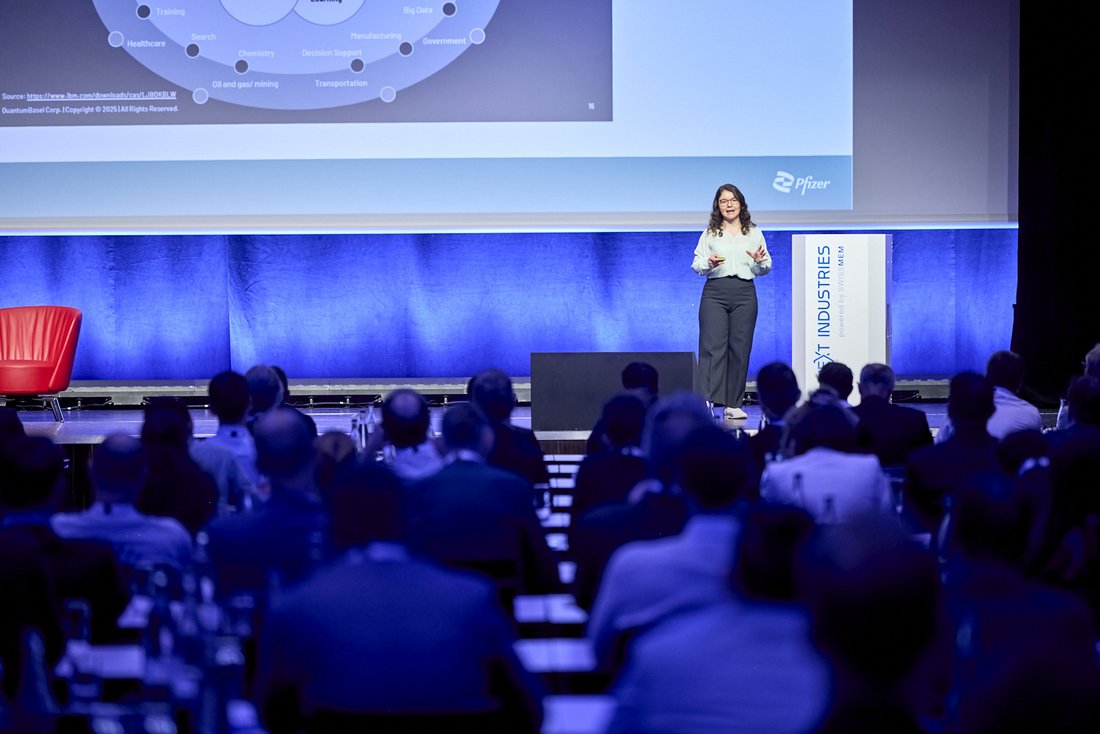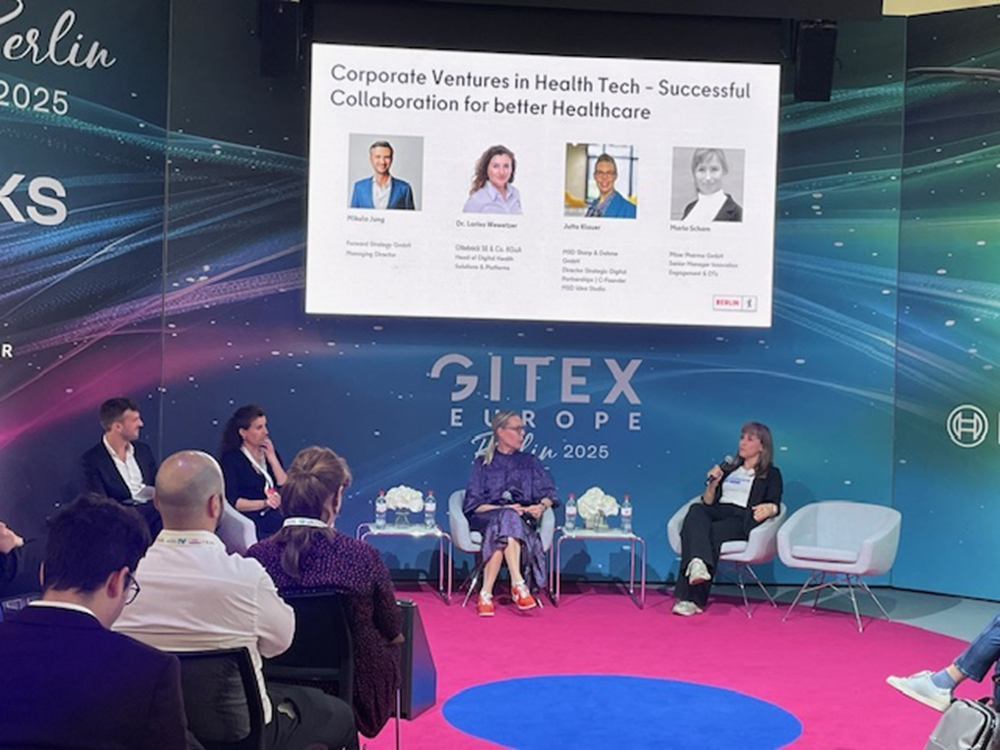
Pfizer’s quantum annealing project on stage at the 2025 industry forum in Windisch
Quantum technologies are no longer a distant dream. They’re already having a measurable impact today. But how can organizations begin exploring such a complex and forward-looking field? With this question in mind, Pembe Gül Bilir spoke at the 2025 industry forum in Brugg-Windisch, sharing how Pfizer’s manufacturing site in Freiburg tested quantum annealing in a proof of technology.
How can transformation in manufacturing succeed? What roles do corporate culture, technology, and new skill sets play? And what does real innovation look like in practice? These were the key questions explored at the 2025 industry forum in Windisch on May 22, where leading voices from across the industrial sector came together to share insights and experiences. The spotlight was on real-world transformation processes, concrete use cases, and the latest developments shaping the digital and technological future of industry.
Pembe Gül Bilir, Innovation Engineer at the Pfizer Healthcare Hub Freiburg and project lead for the quantum annealing initiative, took the audience on an inspiring journey into the world of quantum technologies. She demonstrated:
- How quantum annealing can be used to optimize production planning
Why strong networks are essential for entering the world of quantum technologies—and which other factors are critical for success - And how companies can take meaningful first steps toward application and integration
The future starts with dialogue
The 2025 industry forum made clear: transformation is already underway and quantum technologies are becoming a key pillar of this evolution. Those who invest, connect, and experiment today are actively shaping the industry of tomorrow.

Pfizer Healthcare Hub @GITEX Europe 2025
“Co-creating for better healthcare” – this was the guiding theme of our participation at GITEX Europe, which took place for the first time in Berlin from May 21 to 23. The Pfizer Healthcare Hub offered insights into successful startup-corporate collaborations and shared key learnings from real-world innovation partnerships.
GITEX Europe is one of Europe’s leading tech trade fairs, bringing together innovators, start-ups, and established companies from the digital and healthcare sectors to shape the future of technology and society. In a panel moderated by Mikula Jung, Jutta Klauer (MSD Deutschland), Dr. Larisa Wewetzer (Ottobock), and Maria Scham (Pfizer Healthcare Hub Berlin) shared key success factors and best practices for effective collaboration between corporates and healthtech start-ups.
Three Key Takeaways
Win-win for both sides
Startup–corporate collaborations work best when both sides benefit: while start-ups bring technological expertise and disruptive ideas, corporates like Pfizer contribute regulatory know-how, access to networks, and market experience.
Improving healthcare as a shared goal
Together, we aim to develop solutions that address unmet medical needs and improve patient care and quality of life. A shared understanding of goals is essential for successful collaboration.
Successful partnerships take time
In addition to a certain level of maturity, start-ups need patience when working with corporates. Not every collaboration leads to immediate success – but every experience brings valuable insights.
Best Practice: Our Partnership with Cortrium
A great example of successful collaboration is our partnership with Danish start-up Cortrium.
Read more: Pfizer and Cortrium: This is how a successful sales partnership between a pharmaceutical company and a medtech startup works
Gitex Europe clearly demonstrated: when start-ups and corporates collaborate as equals, they create solutions that go far beyond technological innovation.
Pfizer Healthcare Hub at DMEA 2025: Inspiring conversations and innovative solutions
The Pfizer Healthcare Hub team has had three inspiring days at DMEA: With nearly 900 national and international exhibitors from almost 30 countries, around 470 speakers, and 20,500 participants, DMEA is Europe's leading event for digital healthcare. With keynotes on the digitalization of health, panel discussions, and an exciting DMEA nova Award finale, DMEA impressively showcased the future direction of digital health.
The Healthcare Hub as Pfizer's contact point for innovative start-ups
This year, the Pfizer Healthcare Hub team was once again present to find innovative solutions for patients and healthcare professionals. At our stand in the DiGA & Mobile Health area, we had exciting and inspiring conversations about digital solutions for the healthcare industry, challenges for startups, and potential collaborations with Pfizer.
Our highlights included:
- digital solutions for therapy support and study recruitment in oncology
- solutions for earlier diagnosis of rare diseases
- solutions for better care for patients with dermatological conditions
- promising approaches to process optimization, emission reduction, and efficiency improvement in production
We look forward to further deep dives and to strengthening the connections we have made!
Review of DMEA 2025
Matching innovative technologies with real-world applications: The Pfizer Healthcare Hub InnoSessions
The Pfizer Healthcare Hub links external innovators with interested Pfizer executives with its InnoSessions. Recently visiting: D-Wave, an innovator in the field of applied quantum technology, and the competence center for quantum computing and artificial intelligence QuantumBasel.
Matchmaking of industry-specific challenges with creative solutions
The main actors of an InnoSession are new technologies that have the potential to significantly optimize processes at Pfizer. This information and exchange format brings together innovative technologies from external companies and startups with challenges and application fields at Pfizer. Developers and engineers present their solutions to department heads and interested employees, outlining the functionality, requirements, possibilities, and limitations of the new technology.
In the second part, there is room for questions about specific applications. This allows for a quick and efficient assessment of whether it is worth considering a challenge with the proposed solution.
Requirements for a cooperation with Pfizer
We are often asked what requirements we place on our cooperation partners. For this purpose, we have designed a matching test that checks the potential for a collaboration with Pfizer based on a few questions.
Take the matching test!
InnoSession with quantum computing pioneers D-Wave and QuantumBasel
Two companies that meet our requirements for innovation, maturity, and application potential are D-Wave and Quantum Basel. D-Wave, a leading company in the field of quantum technology, specializes in quantum annealing technology. QuantumBasel is a competence center for quantum computing and AI, aiming to make the potential of quantum computing accessible to as many companies as possible. During an InnoSession at Pfizer's production plant in Freiburg, the two international teams presented how optimization problems can be solved using quantum annealing. In the second part, interested Pfizer representatives discussed possible application fields. We are excited to see what develops from this and will keep you updated!
If you have developed an innovative technology that you would like to present in an InnoSession, please fill out our matching test and contact us! We look forward to inviting innovators from the ecosystem to an InnoSession!
Take the matching test